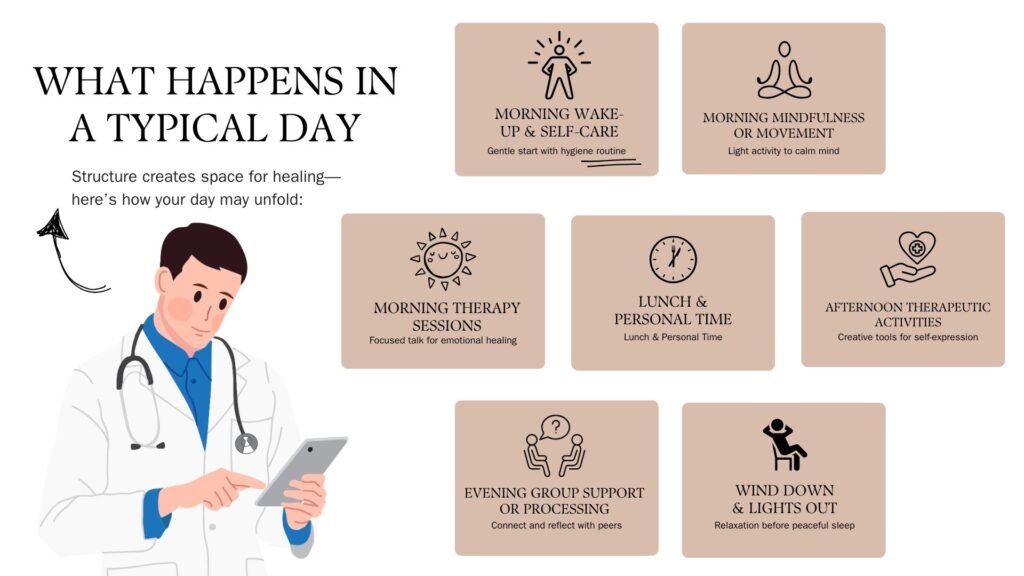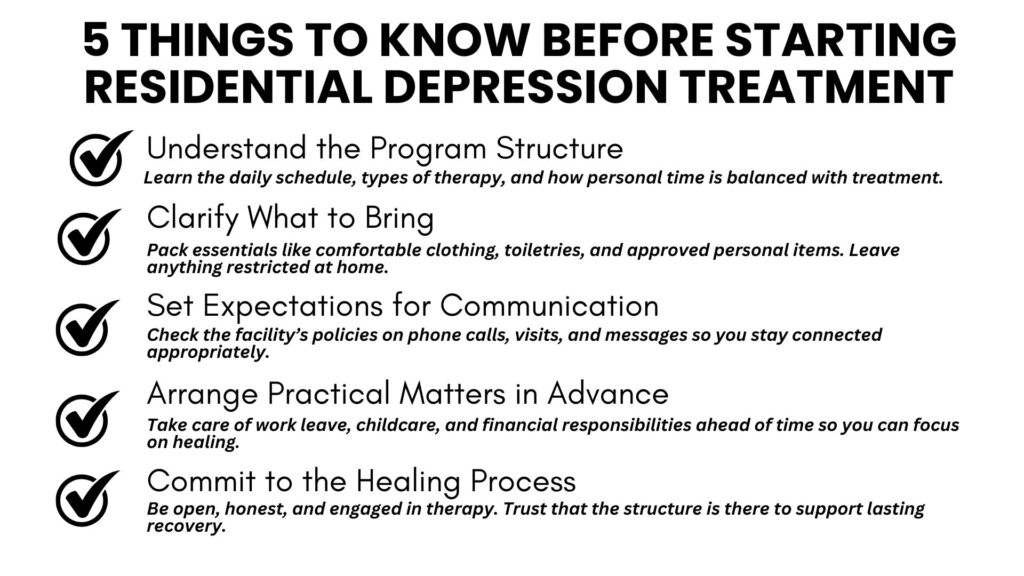Depression͏͏ is͏͏ a͏͏ quiet,͏͏ heavy͏͏ weight͏͏ that͏͏ can͏͏ make͏͏ even͏͏ the͏͏ smallest͏͏ tasks͏͏ feel͏͏ impossible.͏͏ If͏͏ you͏͏ have͏͏ been͏͏ struggling͏͏ for͏͏ a͏͏ while,͏͏ the͏͏ idea͏͏ of͏͏ residential͏͏ treatment͏͏ for͏͏ depression͏͏ might͏͏ feel͏͏ overwhelming͏͏ or͏͏ maybe͏͏ even͏͏ a͏͏ little͏͏ hopeful.͏͏ What͏͏ does͏͏ a͏͏ day͏͏ inside͏͏ a͏͏ treatment͏͏ facility͏͏ for͏͏ depression͏͏ really͏͏ look͏͏ like?͏͏ And͏͏ how͏͏ can͏͏ being͏͏ in͏͏ that͏͏ kind͏͏ of͏͏ environment͏͏ help͏͏ when͏͏ everything͏͏ feels͏͏ so͏͏ overwhelming?
Residential͏͏ treatment͏͏ for͏͏ depression͏͏ is͏͏ not͏͏ about͏͏ cold͏͏ medical͏͏ routines͏͏ or͏͏ strict͏͏ schedules.͏͏ It͏͏ is͏͏ about͏͏ finding͏͏ a͏͏ place͏͏ where͏͏ healing͏͏ feels͏͏ safe,͏͏ where͏͏ you͏͏ are͏͏ seen͏͏ as͏͏ more͏͏ than͏͏ your͏͏ diagnosis,͏͏ and͏͏ where͏͏ the͏͏ support͏͏ you͏͏ need͏͏ is͏͏ available͏͏ all͏͏ day͏͏ and͏͏ night.͏͏ If͏͏ you͏͏ or͏͏ someone͏͏ you͏͏ love͏͏ is͏͏ considering͏͏ this͏͏ kind͏͏ of͏͏ care,͏͏ understanding͏͏ what͏͏ to͏͏ expect͏͏ can͏͏ help͏͏ bring͏͏ calm͏͏ to͏͏ the͏͏ unknown͏͏ and͏͏ maybe͏͏ even͏͏ a͏͏ spark͏͏ of͏͏ hope.
What͏͏ Is͏͏ Residential͏͏ Treatment͏͏ for͏͏ Depression?
Residential͏͏ treatment͏͏ for͏͏ depression͏͏ means͏͏ living͏͏ at͏͏ a͏͏ residential͏͏ treatment͏͏ center͏͏ for͏͏ depression͏͏ in͏͏ Arizona͏͏ or͏͏ elsewhere͏͏ to͏͏ fully͏͏ focus͏͏ on͏͏ your͏͏ mental͏͏ health.͏͏ It͏͏ offers͏͏ 24/7͏͏ support͏͏ in͏͏ a͏͏ safe,͏͏ welcoming͏͏ setting͏͏ to͏͏ address͏͏ the͏͏ deeper͏͏ causes͏͏ of͏͏ depression,͏͏ not͏͏ just͏͏ symptoms.
People͏͏ usually͏͏ choose͏͏ residential͏͏ treatment͏͏ programs͏͏ when͏͏ outpatient͏͏ treatment͏͏ or͏͏ therapy͏͏ isn’t͏͏ enough͏͏ or͏͏ when͏͏ depression͏͏ makes͏͏ daily͏͏ life͏͏ overwhelming.͏͏ You’ll͏͏ take͏͏ part͏͏ in͏͏ one-on-one͏͏ counseling,͏͏ group͏͏ sessions,͏͏ and͏͏ behavioral͏͏ therapies͏͏ like͏͏ cognitive-behavioral͏͏ therapy͏͏ to͏͏ help͏͏ change͏͏ negative͏͏ thought͏͏ patterns.
Residential͏͏ treatment͏͏ differs͏͏ from͏͏ inpatient͏͏ treatment͏͏ for͏͏ depression,͏͏ which͏͏ is͏͏ often͏͏ shorter͏͏ and͏͏ focuses͏͏ on͏͏ medical͏͏ stabilization.͏͏ Residential͏͏ treatment͏͏ centers͏͏ for͏͏ depression͏͏ in͏͏ Arizona͏͏ provide͏͏ more͏͏ time͏͏ and͏͏ space͏͏ to͏͏ develop͏͏ coping͏͏ skills͏͏ and͏͏ prepare͏͏ for͏͏ life͏͏ after͏͏ treatment,͏͏ aiming͏͏ for͏͏ lasting͏͏ recovery.
What͏͏ Happens͏͏ in͏͏ a͏͏ Typical͏͏ Day͏͏ During͏͏ Residential͏͏ Treatment?
Days͏͏ in͏͏ residential͏͏ treatment͏͏ programs͏͏ are͏͏ designed͏͏ to͏͏ provide͏͏ structure,͏͏ which͏͏ can͏͏ feel͏͏ really͏͏ comforting͏͏ when͏͏ depression͏͏ makes͏͏ everything͏͏ seem͏͏ overwhelming͏͏ or͏͏ unpredictable.͏͏ Here͏͏ is͏͏ what͏͏ a͏͏ day͏͏ might͏͏ look͏͏ like:
- Starting͏͏ the͏͏ morning͏͏ with͏͏ a͏͏ group͏͏ check-in͏͏ where͏͏ people͏͏ share͏͏ how͏͏ they͏͏ are͏͏ feeling.͏͏ It͏͏ is͏͏ a͏͏ chance͏͏ to͏͏ feel͏͏ heard͏͏ and͏͏ less͏͏ alone.
- Meeting͏͏ one-on-one͏͏ with͏͏ a͏͏ therapist͏͏ from͏͏ your͏͏ treatment͏͏ team͏͏ to͏͏ talk͏͏ about͏͏ what͏͏ is͏͏ going͏͏ on͏͏ in͏͏ your͏͏ life͏͏ and͏͏ set͏͏ goals͏͏ for͏͏ your͏͏ recovery.
- Spending͏͏ afternoons͏͏ in͏͏ different͏͏ kinds͏͏ of͏͏ therapy͏͏ such͏͏ as͏͏ group͏͏ sessions͏͏ that͏͏ build͏͏ support͏͏ and͏͏ understanding͏͏ or͏͏ skill͏͏ workshops͏͏ that͏͏ help͏͏ you͏͏ handle͏͏ stress͏͏ and͏͏ tough͏͏ emotions͏͏ better.
- Taking͏͏ time͏͏ for͏͏ creative͏͏ outlets͏͏ like͏͏ art͏͏ or͏͏ music͏͏ or͏͏ getting͏͏ some͏͏ gentle͏͏ exercise͏͏ to͏͏ help͏͏ clear͏͏ your͏͏ mind.
- Practicing͏͏ mindfulness͏͏ or͏͏ simple͏͏ breathing͏͏ exercises͏͏ to͏͏ find͏͏ moments͏͏ of͏͏ calm.
- Evenings͏͏ are͏͏ usually͏͏ more͏͏ relaxed͏͏ with͏͏ chances͏͏ to͏͏ hang͏͏ out͏͏ with͏͏ peers͏͏ or͏͏ just͏͏ have͏͏ quiet͏͏ time.͏͏ Staff͏͏ are͏͏ around͏͏ if͏͏ you͏͏ need͏͏ someone͏͏ to͏͏ talk͏͏ to.
The͏͏ routine͏͏ helps͏͏ create͏͏ a͏͏ safe͏͏ space͏͏ where͏͏ things͏͏ feel͏͏ a͏͏ little͏͏ more͏͏ predictable͏͏ and͏͏ manageable.͏͏ For͏͏ many͏͏ people,͏͏ this͏͏ steady͏͏ rhythm͏͏ is͏͏ a͏͏ first͏͏ step͏͏ toward͏͏ feeling͏͏ like͏͏ themselves͏͏ again.

How͏͏ Long͏͏ Does͏͏ Residential͏͏ Treatment͏͏ for͏͏ Depression͏͏ Last?
The͏͏ length͏͏ of͏͏ residential͏͏ treatment͏͏ varies͏͏ because͏͏ each͏͏ person’s͏͏ journey͏͏ is͏͏ unique.͏͏ Some͏͏ programs͏͏ last͏͏ a͏͏ few͏͏ weeks,͏͏ while͏͏ others͏͏ continue͏͏ for͏͏ months.͏͏ It͏͏ depends͏͏ on͏͏ your͏͏ individual͏͏ needs,͏͏ the͏͏ severity͏͏ of͏͏ your͏͏ major͏͏ depressive͏͏ disorder,͏͏ and͏͏ how͏͏ you͏͏ respond͏͏ to͏͏ treatment.
The͏͏ stay͏͏ length͏͏ is͏͏ based͏͏ on͏͏ your͏͏ progress,͏͏ not͏͏ a͏͏ fixed͏͏ timeline.͏͏ The͏͏ goal͏͏ is͏͏ to͏͏ build͏͏ coping͏͏ skills,͏͏ address͏͏ underlying͏͏ issues,͏͏ and͏͏ feel͏͏ stable͏͏ before͏͏ moving͏͏ to͏͏ the͏͏ next͏͏ step͏͏ in͏͏ depression͏͏ recovery͏͏ centers͏͏ or͏͏ outpatient͏͏ programming.
Your͏͏ treatment͏͏ team͏͏ will͏͏ regularly͏͏ check͏͏ your͏͏ progress͏͏ and͏͏ adjust͏͏ your͏͏ plan.͏͏ This͏͏ ensures͏͏ you͏͏ get͏͏ the͏͏ right͏͏ level͏͏ of͏͏ care͏͏ and͏͏ support͏͏ when͏͏ you͏͏ need͏͏ it͏͏ most.
What͏͏ Types͏͏ of͏͏ Therapy͏͏ Are͏͏ Used͏͏ in͏͏ Residential͏͏ Treatment͏͏ for͏͏ Depression?
Residential͏͏ treatment͏͏ programs͏͏ offer͏͏ a͏͏ mix͏͏ of͏͏ therapies͏͏ designed͏͏ to͏͏ address͏͏ depression͏͏ from͏͏ different͏͏ angles.͏͏ You͏͏ are͏͏ not͏͏ just͏͏ sitting͏͏ in͏͏ one͏͏ kind͏͏ of͏͏ therapy͏͏ all͏͏ day.͏͏ Instead,͏͏ the͏͏ goal͏͏ is͏͏ to͏͏ provide͏͏ a͏͏ variety͏͏ of͏͏ ways͏͏ to͏͏ understand͏͏ your͏͏ feelings,͏͏ develop͏͏ new͏͏ skills,͏͏ and͏͏ find͏͏ what͏͏ works͏͏ best͏͏ for͏͏ you.
Here͏͏ are͏͏ some͏͏ common͏͏ behavioral͏͏ therapies͏͏ and͏͏ treatment͏͏ options͏͏ you͏͏ might͏͏ experience:
- Cognitive͏͏ Behavioral͏͏ Therapy͏͏ (CBT):͏͏ Helps͏͏ you͏͏ recognize͏͏ and͏͏ change͏͏ negative͏͏ thought͏͏ patterns͏͏ that͏͏ contribute͏͏ to͏͏ depression.͏͏ It͏͏ is͏͏ practical͏͏ and͏͏ skills-focused.
- Group͏͏ Therapy:͏͏ Being͏͏ with͏͏ others͏͏ who͏͏ are͏͏ going͏͏ through͏͏ similar͏͏ struggles͏͏ can͏͏ create͏͏ a͏͏ powerful͏͏ sense͏͏ of͏͏ support͏͏ and͏͏ belonging.͏͏ It͏͏ also͏͏ helps͏͏ practice͏͏ communication͏͏ and͏͏ empathy.
- Dialectical͏͏ Behavior͏͏ Therapy͏͏ (DBT):͏͏ Focuses͏͏ on͏͏ managing͏͏ intense͏͏ emotions͏͏ and͏͏ building͏͏ healthy͏͏ coping͏͏ strategies.
- Creative͏͏ Therapies:͏͏ Art,͏͏ music,͏͏ or͏͏ movement͏͏ therapy͏͏ can͏͏ offer͏͏ a͏͏ way͏͏ to͏͏ express͏͏ feelings͏͏ that͏͏ are͏͏ hard͏͏ to͏͏ put͏͏ into͏͏ words.
- Mindfulness͏͏ and͏͏ Relaxation͏͏ Techniques:͏͏ These͏͏ practices͏͏ teach͏͏ you͏͏ how͏͏ to͏͏ stay͏͏ present͏͏ and͏͏ reduce͏͏ stress,͏͏ which͏͏ can͏͏ be͏͏ helpful͏͏ when͏͏ depression͏͏ makes͏͏ your͏͏ mind͏͏ race͏͏ or͏͏ spiral.
- Medication͏͏ Management:͏͏ Many͏͏ treatment͏͏ centers͏͏ have͏͏ psychiatrists͏͏ who͏͏ can͏͏ help͏͏ figure͏͏ out͏͏ if͏͏ medication͏͏ might͏͏ be͏͏ right͏͏ for͏͏ you͏͏ and͏͏ monitor͏͏ how͏͏ it͏͏ is͏͏ working͏͏ to͏͏ minimize͏͏ side͏͏ effects.
Therapists͏͏ work͏͏ together͏͏ to͏͏ tailor͏͏ your͏͏ residential͏͏ mental͏͏ health͏͏ treatment,͏͏ combining͏͏ these͏͏ approaches͏͏ to͏͏ fit͏͏ your͏͏ unique͏͏ needs.͏͏ This͏͏ variety͏͏ helps͏͏ make͏͏ sure͏͏ you͏͏ are͏͏ supported͏͏ on͏͏ multiple͏͏ levels͏͏ emotionally,͏͏ mentally,͏͏ and͏͏ sometimes͏͏ physically.
How͏͏ Is͏͏ Residential͏͏ Treatment͏͏ Different͏͏ from͏͏ Inpatient͏͏ Care?
People͏͏ often͏͏ wonder͏͏ if͏͏ residential͏͏ treatment͏͏ is͏͏ the͏͏ same͏͏ as͏͏ inpatient͏͏ treatment.͏͏ While͏͏ they͏͏ share͏͏ some͏͏ similarities,͏͏ there͏͏ are͏͏ important͏͏ differences.
Inpatient͏͏ care͏͏ usually͏͏ refers͏͏ to͏͏ short-term,͏͏ intensive͏͏ treatment͏͏ for͏͏ people͏͏ who͏͏ may͏͏ need͏͏ medical͏͏ supervision,͏͏ such͏͏ as͏͏ after͏͏ a͏͏ crisis͏͏ or͏͏ severe͏͏ episode.͏͏ It͏͏ is͏͏ often͏͏ hospital-based͏͏ and͏͏ focused͏͏ on͏͏ stabilization.
Residential͏͏ treatment,͏͏ on͏͏ the͏͏ other͏͏ hand,͏͏ typically͏͏ offers͏͏ longer-term͏͏ support͏͏ in͏͏ a͏͏ more͏͏ home-like͏͏ setting.͏͏ It͏͏ is͏͏ less͏͏ about͏͏ emergency͏͏ care͏͏ and͏͏ more͏͏ about͏͏ providing͏͏ a͏͏ safe,͏͏ steady͏͏ environment͏͏ where͏͏ you͏͏ can͏͏ work͏͏ on͏͏ recovery͏͏ every͏͏ day.
Here͏͏ is͏͏ how͏͏ they͏͏ differ:
- Length͏͏ of͏͏ Stay:͏͏ Inpatient͏͏ treatment͏͏ tends͏͏ to͏͏ be͏͏ shorter,͏͏ often͏͏ a͏͏ few͏͏ days͏͏ to͏͏ a͏͏ couple͏͏ of͏͏ weeks.͏͏ Residential͏͏ treatment͏͏ programs͏͏ usually͏͏ last͏͏ several͏͏ weeks͏͏ to͏͏ a͏͏ few͏͏ months.
- Level͏͏ of͏͏ Medical͏͏ Supervision:͏͏ Inpatient͏͏ care͏͏ includes͏͏ close͏͏ medical͏͏ monitoring.͏͏ Residential͏͏ treatment͏͏ has͏͏ staff͏͏ available͏͏ 24/7͏͏ but͏͏ focuses͏͏ more͏͏ on͏͏ therapy͏͏ and͏͏ daily͏͏ structure͏͏ than͏͏ medical͏͏ intervention.
- Focus:͏͏ Inpatient͏͏ care͏͏ aims͏͏ to͏͏ stabilize͏͏ symptoms͏͏ quickly,͏͏ while͏͏ residential͏͏ treatment͏͏ focuses͏͏ on͏͏ healing,͏͏ skill-building,͏͏ and͏͏ preparing͏͏ you͏͏ for͏͏ life͏͏ after͏͏ treatment.
- Environment:͏͏ Residential͏͏ treatment͏͏ centers͏͏ often͏͏ feel͏͏ more͏͏ like͏͏ a͏͏ community͏͏ or͏͏ supportive͏͏ home,͏͏ which͏͏ can͏͏ help͏͏ people͏͏ feel͏͏ more͏͏ comfortable͏͏ and͏͏ connected.
Understanding͏͏ these͏͏ differences͏͏ can͏͏ help͏͏ you͏͏ choose͏͏ the͏͏ right͏͏ level͏͏ of͏͏ care͏͏ for͏͏ your͏͏ situation.͏͏ Both͏͏ have͏͏ important͏͏ roles,͏͏ but͏͏ residential͏͏ treatment͏͏ is͏͏ a͏͏ good͏͏ fit͏͏ for͏͏ those͏͏ ready͏͏ to͏͏ dive͏͏ deeper͏͏ into͏͏ healing͏͏ and͏͏ growth.
Common͏͏ Questions͏͏ and͏͏ Misunderstandings
What͏͏ is͏͏ a͏͏ day͏͏ really͏͏ like͏͏ in͏͏ residential͏͏ treatment͏͏ for͏͏ depression?
It͏͏ is͏͏ normal͏͏ to͏͏ feel͏͏ unsure͏͏ about͏͏ daily͏͏ life͏͏ in͏͏ treatment.͏͏ Days͏͏ are͏͏ structured͏͏ but͏͏ balanced,͏͏ mixing͏͏ therapy͏͏ sessions,͏͏ wellness͏͏ activities,͏͏ and͏͏ downtime.͏͏ This͏͏ routine͏͏ creates͏͏ a͏͏ safe͏͏ space͏͏ for͏͏ healing,͏͏ helping͏͏ reduce͏͏ anxiety͏͏ while͏͏ teaching͏͏ coping͏͏ skills͏͏ that͏͏ support͏͏ recovery͏͏ beyond͏͏ treatment.
How͏͏ does͏͏ residential͏͏ treatment͏͏ help͏͏ if͏͏ I͏͏ have͏͏ depression͏͏ and͏͏ other͏͏ issues͏͏ like͏͏ anxiety͏͏ or͏͏ substance͏͏ abuse?
Many͏͏ people͏͏ face͏͏ depression͏͏ alongside͏͏ anxiety͏͏ or͏͏ substance͏͏ abuse.͏͏ Residential͏͏ treatment͏͏ offers͏͏ integrated͏͏ care,͏͏ meaning͏͏ your͏͏ whole͏͏ experience͏͏ is͏͏ addressed͏͏ together.͏͏ Therapists͏͏ and͏͏ medical͏͏ staff͏͏ tailor͏͏ support͏͏ to͏͏ your͏͏ unique͏͏ needs,͏͏ helping͏͏ you͏͏ heal͏͏ more͏͏ fully͏͏ and͏͏ feel͏͏ understood.
“Residential͏͏ treatment͏͏ is͏͏ only͏͏ for͏͏ people͏͏ with͏͏ severe͏͏ depression.”
It͏͏ is͏͏ a͏͏ common͏͏ belief,͏͏ but͏͏ anyone͏͏ struggling͏͏ with͏͏ depression͏͏ who͏͏ has͏͏ not͏͏ found͏͏ relief͏͏ through͏͏ outpatient͏͏ treatment͏͏ can͏͏ benefit͏͏ from͏͏ residential͏͏ treatment.͏͏ It͏͏ is͏͏ designed͏͏ to͏͏ provide͏͏ intensive͏͏ support͏͏ and͏͏ structure,͏͏ helping͏͏ people͏͏ at͏͏ different͏͏ stages͏͏ of͏͏ their͏͏ journey͏͏ not͏͏ just͏͏ those͏͏ with͏͏ the͏͏ most͏͏ severe͏͏ symptoms.
“Once͏͏ residential͏͏ treatment͏͏ ends,͏͏ I͏͏ am͏͏ on͏͏ my͏͏ own.”
Many͏͏ worry͏͏ about͏͏ what͏͏ happens͏͏ after͏͏ leaving͏͏ treatment.͏͏ The͏͏ truth͏͏ is͏͏ residential͏͏ programs͏͏ include͏͏ aftercare͏͏ planning͏͏ and͏͏ ongoing͏͏ support͏͏ options.͏͏ You͏͏ will͏͏ not͏͏ be͏͏ left͏͏ alone.͏͏ Therapists͏͏ help͏͏ you͏͏ build͏͏ a͏͏ network͏͏ of͏͏ resources͏͏ and͏͏ skills͏͏ to͏͏ maintain͏͏ progress͏͏ and͏͏ handle͏͏ challenges͏͏ as͏͏ they͏͏ come.

Is͏͏ Residential͏͏ Treatment͏͏ Effective͏͏ For͏͏ Depression?
Residential͏͏ treatment͏͏ for͏͏ depression͏͏ is͏͏ highly͏͏ effective͏͏ for͏͏ many͏͏ people,͏͏ especially͏͏ those͏͏ with͏͏ moderate͏͏ to͏͏ severe͏͏ symptoms.͏͏ This͏͏ level͏͏ of͏͏ care͏͏ offers͏͏ structured͏͏ support,͏͏ personalized͏͏ therapies,͏͏ and͏͏ coping͏͏ skills͏͏ development͏͏ that͏͏ outpatient͏͏ treatment͏͏ alone͏͏ may͏͏ not͏͏ provide.
What͏͏ Makes͏͏ Residential͏͏ Treatment͏͏ Different͏͏ from͏͏ Other͏͏ Options?
Residential͏͏ treatment͏͏ offers͏͏ 24/7͏͏ support͏͏ and͏͏ a͏͏ structured͏͏ setting,͏͏ unlike͏͏ outpatient͏͏ treatment.͏͏ It͏͏ suits͏͏ moderate͏͏ to͏͏ severe͏͏ depression͏͏ or͏͏ major͏͏ depressive͏͏ disorder͏͏ needing͏͏ more͏͏ than͏͏ outpatient͏͏ care,͏͏ making͏͏ it͏͏ a͏͏ top͏͏ depression͏͏ treatment͏͏ program͏͏ and͏͏ facility͏͏ for͏͏ depression.
Taking͏͏ the͏͏ Next͏͏ Step͏͏ Toward͏͏ Healing
If͏͏ you͏͏ are͏͏ wondering͏͏ whether͏͏ residential͏͏ treatment͏͏ is͏͏ right͏͏ for͏͏ you͏͏ or͏͏ a͏͏ loved͏͏ one,͏͏ it͏͏ is͏͏ worth͏͏ reflecting͏͏ on͏͏ your͏͏ current͏͏ needs͏͏ and͏͏ challenges.͏͏ Residential͏͏ care͏͏ is͏͏ not͏͏ for͏͏ everyone,͏͏ but͏͏ for͏͏ those͏͏ struggling͏͏ with͏͏ persistent͏͏ or͏͏ severe͏͏ depression͏͏ or͏͏ mood͏͏ disorders,͏͏ it͏͏ can͏͏ provide͏͏ the͏͏ level͏͏ of͏͏ support͏͏ needed͏͏ to͏͏ make͏͏ real͏͏ progress.
Choosing͏͏ residential͏͏ treatment͏͏ is͏͏ a͏͏ brave͏͏ and͏͏ important͏͏ decision.͏͏ It͏͏ means͏͏ prioritizing͏͏ your͏͏ mental͏͏ health͏͏ and͏͏ committing͏͏ to͏͏ healing͏͏ in͏͏ a͏͏ focused͏͏ way.͏͏ If͏͏ you͏͏ feel͏͏ ready,͏͏ the͏͏ next͏͏ step͏͏ is͏͏ to͏͏ explore͏͏ depression͏͏ treatment͏͏ centers͏͏ and͏͏ talk͏͏ with͏͏ professionals͏͏ who͏͏ can͏͏ help͏͏ guide͏͏ you.
Remember,͏͏ reaching͏͏ out͏͏ for͏͏ help͏͏ is͏͏ a͏͏ sign͏͏ of͏͏ strength.͏͏ You͏͏ do͏͏ not͏͏ have͏͏ to͏͏ face͏͏ depression͏͏ alone.
Begin͏͏ Your͏͏ Journey͏͏ to͏͏ Emotional͏͏ Wellness͏͏ with͏͏ Rock͏͏ View͏͏ Recovery
Residential͏͏ treatment͏͏ for͏͏ depression͏͏ offers͏͏ a͏͏ safe͏͏ and͏͏ nurturing͏͏ environment͏͏ to͏͏ begin͏͏ healing͏͏ from͏͏ mood͏͏ disorders.͏͏ With͏͏ a͏͏ dedicated͏͏ treatment͏͏ team͏͏ and͏͏ personalized͏͏ behavioral͏͏ therapies,͏͏ you͏͏ can͏͏ take͏͏ meaningful͏͏ steps͏͏ toward͏͏ emotional͏͏ stability͏͏ and͏͏ growth.
As͏͏ one͏͏ of͏͏ the͏͏ best͏͏ residential͏͏ treatment͏͏ centers͏͏ for͏͏ depression,͏͏ Rock͏͏ View͏͏ Recovery͏͏ provides͏͏ comprehensive͏͏ depression͏͏ treatment͏͏ options͏͏ tailored͏͏ to͏͏ your͏͏ unique͏͏ needs.͏͏ If͏͏ you͏͏ want͏͏ to͏͏ learn͏͏ more͏͏ about͏͏ our͏͏ residential͏͏ mental͏͏ health͏͏ treatment͏͏ programs͏͏ or͏͏ speak͏͏ with͏͏ someone͏͏ about͏͏ your͏͏ care,͏͏ please͏͏ visit͏͏ Rock͏͏ View͏͏ Recovery͏͏ Residential͏͏ Treatment.͏͏ Support͏͏ is͏͏ available,͏͏ and͏͏ your͏͏ path͏͏ to͏͏ recovery͏͏ can͏͏ start͏͏ today.
